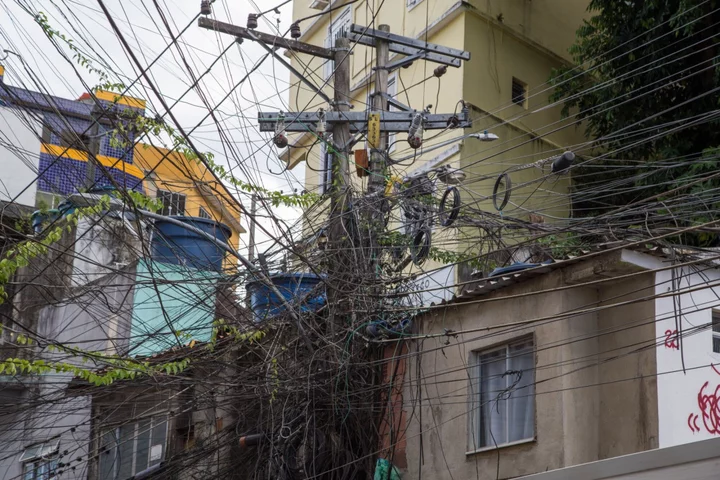Rio de Janeiro’s electric company says so many people are stealing power in the city’s slums that it has been pushed into default, causing a massive selloff and attracting a veteran buyer of distressed Brazilian corporations.
Light SA lost around $200 million last year from the illegal hookups, perched like a tangle of wire birds’ nests atop power poles across Rio’s favelas. That’s even after years of investment to prevent theft.
The 120-year-old utility says it can’t keep absorbing the losses, which also include delinquencies and judicial costs. As a June deadline approaches, it is mulling walking away from its contract with the city, an unlikely and unprecedented move that has the potential of throwing Brazil’s second-largest city into an electricity-supply crisis.
Light last year posted its worst results since at least 2006, as an economic slowdown reduced demand from large clients and increased delinquencies. Its debt levels soared due to higher interest rates.
The company is now pressing the government to raise tariffs. Otherwise, it says, the business is unviable. It could use its holding company to file for bankruptcy protection, according to a person familiar with the matter.
“Everybody was expecting the energy losses to decline, and that was a frustration,” said Lucas Rios, the primary analyst for Light at Fitch Ratings. If the holding company files for bankruptcy protection, “it’s going to be very difficult.”
Already, the company won a court order allowing it to temporarily halt payments to financial creditors, which ratings firms, including S&P Global Markets, classified as a default. Its dollar bonds have handed investors losses of 55% this year, among the worst performers in Latin America.
The notes traded around 38 cents on the dollar Tuesday, according to Trace data. Shares gained as much as 3.4% to 3.93 reais but are still down 16% this year.
Read more: Loss After Loss Bruises Billionaire’s Reputation in Brazil
In the wake of the selloff, one of Brazil’s best-known distressed investors, Nelson Tanure, swooped in and bought a 10% stake.
Tanure, 71, burnished his reputation starting in the 1980s when he bought a bankrupt shipyard. He has since acquired stakes in real estate, oil, newspaper, healthcare and telecom companies, including Oi SA after it filed for its first bankruptcy protection against creditors in 2016.
He told advisers to Light’s local bondholders in a meeting last week that he is planning to invest as much as 1 billion reais ($200 million) more, according to people familiar with the private meeting.
That would potentially make him the biggest shareholder, surpassing billionaire Carlos Sicupira, who holds around 10% of the stock, and Ronaldo Cezar Coelho, who owns 20%. Tanure also said he may try to change Light’s management and advisers, the people said.
Tanure declined to comment.
Funds managed by Brazilian equity-focused asset manager Tempo Capital also boosted their combined stake to 7.16%, Light said in an April filing.
The company, which supplies energy to 11.6 million people using more than 50,000 miles of transmission lines, hired Chief Executive Officer Octavio Lopes last year. A private equity veteran who helped turn around a troubled utility in Maranhao state, Lopes is pushing “opportunistic strategy” to get the best terms possible for Light, Rios said.
The company has until June to express interest in negotiating renewal of its concession, starting in 2026. It has said it can only go forward with the process if it can charge higher rates to compensate for the widespread larceny, mainly across hillside slums where policing is patchy or non-existent.
Theft made up more than 27% of the total grid load last year, Light reported. The company also changed some of the methodologies for how it calculates expected losses from delinquencies, all of which contributed to a net loss of 5.7 billion reais last year. It is scheduled to report first-quarter earnings on May 11.
While Lopes told analysts and investors in late March that giving back the concession was unlikely, UBS Group AG analyst Giuliano Ajeje said that’s what he expects it to do. It would raise the question of how much cash will be left to pay back bondholders and shareholders, he said.
In an emailed response to questions, Light said it has a constructive dialog with authorities and is seeking a “structural and definitive solution” for the historic problems with the concession. A new contract needs to take into account Rio’s particular situation, be economically and financially sustainable and help strengthen the industry, the company said.
Read more: Moelis Hired by Creditors of Troubled Rio Utility For Debt Talks
However, Energy Minister Alexandre Silveira has signaled that negotiations with Light will only get more contentious. In an interview with CNN Brazil on Monday he called it an example of an inefficient utility that shouldn’t be involved in the concession-renewal process.
The country’s power regulator, Aneel, is reviewing Light’s tariffs. But there are few good options.
Too big an increase in rates could set off a chain reaction among other utilities seeking similar benefits. If Light uses its holding company to file for bankruptcy protection, it would face a court battle against creditors — Brazilian law prohibits power companies from using the bankruptcy process.
The move could also disrupt the finances of Light’s supply chain of power producers and transmission companies, causing more defaults.
Light’s decision to hire Laplace Finance as a restructuring adviser was a sign it is taking the gloves off in its negotiations with the government, Rios, the Fitch analyst, said.
“You will affect suppliers,” he added. “It’s a mess.”
(Adds Tuesday stock and bond prices in 8th paragraph)

